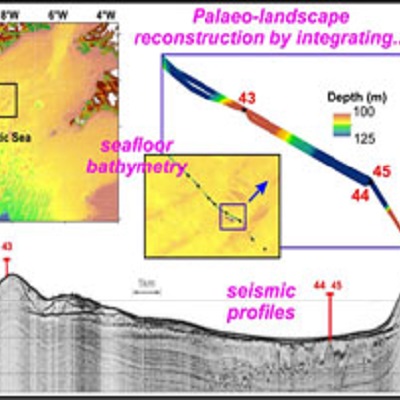Glacial sculpting and post-glacial drowning of the Celtic Sea

You will reconstruct different landform assemblages from geophysical and sedimentological data, revealing how landscapes have evolved offshore the UK and Ireland from the Last Glacial Maximum (LGM) to the present day.
Why do we care about palaeo-landscapes?
Studying the sedimentary records of former ice sheets provides insights into ongoing changes in warming polar regions. Most of the British Isles were covered in glacial ice 25000 years ago, and we now know that this included large areas of the present-day marine environment. What we don’t know is the extent to which the ice sculpted landscapes, how quickly ice melted, coastlines changed or how much sediment was injected into the system by the ice.
What will you study?
In the Celtic Sea, an extensive field of seabed ridges has been interpreted to be the world’s largest palaeo-tidal sand banks formed during rising sea levels. However, glacigenic sediments found on some ridges have fuelled a lively debate. Could these be glacial landforms, recording grounded ice at the shelf edge, far beyond currently accepted limits? This collaboration among the people behind opposing theories will facilitate high-impact research.
What will you do?
As part of a multi-disciplinary team, you will follow an integrated approach to:
(1) Reconstruct glacial to marine landform assemblages and sediment sources. The datasets include geophysical data and many sediment cores. You will spend up to 6 months at the British Geological Survey in Edinburgh.
(2) Test models of Irish Sea Ice Stream retreat and post-glacial palaeo-tidal changes.
(3) Design an integrated glacial to post-glacial history of the Celtic Sea, visualised in a 3D time-lapse model.
What will you receive?
Plenty of support and training from word-leading experts in the BRITICE-CHRONO Consortium project. From the British Geological Survey, you will also receive an additional £3500 (£1000 per year) to your stipend.
Eligibility: Applicants should hold a minimum of a UK Honours Degree at 2:1 level or equivalent in subjects such as Environmental Science, Environmental Engineering, (Marine) Geology, Physical Oceanography or Natural Sciences. Good numerical skills are needed with the capacity to develop a steep learning curve in the various aspects of this multi-disciplinary research and in software applications.
For further details please do not hesitate to contact Prof. James Scourse via
(1) email: j.scourse@bangor.ac.uk or
(2) telephone: 0044(0)1248 382876
or Dr. Katrien Van Landeghem via
(1) email: k.v.landeghem@bangor.ac.uk or
(2) telephone: 0044(0)1248 388161
